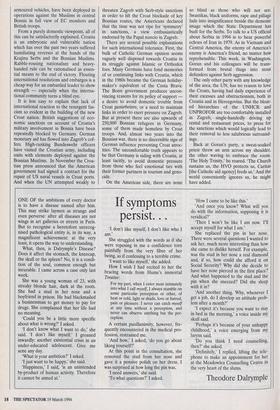If symptoms
persist.. .
ONE OF the ambitions of every doctor is to have a disease named after him. This may strike laymen as strange and even perverse: after all diseases are not wings in art galleries or streets in Paris. But to recognise a heretofore unrecog- nised pathological entity is, in its way, a magnificent achievement: at the very least, it opens the way to understanding.
What, then, is Dalrymple's Disease? Does it affect the stomach, the kneecap, the skull or the spleen? No, it is a condi- tion of the soul, common enough but incurable. I came across a case only last week.
She was a young woman of 23, with streaky blonde hair, dark at the roots. She had a stud in her nose and a boyfriend in prison. He had blackmailed a businessman to get money to pay for drugs. She complained that her life had no meaning.
`Could you be a little more specific about what is wrong?' I asked.
`I don't know what I want to do,' she said. 'I don't like myself.' I groaned inwardly: another existential crisis in an under-educated adolescent. Give me acne any day.
`What is your ambition?' I asked.
`I just want to be happy,' she said.
`Happiness,' I said, 'is an unintended by-product of human activity. Therefore it cannot be aimed at.' `I don't like myself, I don't like who I am.'
She struggled with the words as if she were reposing in me a confidence torn painfully from the very fibre of her being, as if confessing to a terrible crime.
`I want to like myself,' she added.
How I wish I had recited to her the bracing words from Hume's immortal Treatise: For my part, when I enter most intimately into what I call myself, I always stumble on some particular perception or other, of heat or cold, light or shade, love or hatred, pain or pleasure. I never can catch myself at any time without a perception, and never can observe anything but the per- ception.
A certain pusillanimity, however, fre- quently encountered in the medical pro- fession, restrained me.
`And how,' I asked, 'do you go about liking yourself?'
At this point in the consultation, she removed the stud from her nose and gave it a pensive polish on her dress. I was surprised at how long the pin was.
`I need answers,' she said.
`To what questions?' I asked. `How I came to be like this.'
`And once you know? What will you do with the information, supposing it is veridical?'
`Then I won't be like I am now. I'll accept myself for what I am.'
She replaced the pin in her nose. There were several questions I wanted to ask her, much more interesting than how she came to dislike herself. For example, was the stud in her nose a real diamond and, if so, how could she afford it on Social Security? Why did she decide to have her nose pierced in the first place? And what happened to the stud and the pin when she sneezed? Did she sleep with it in?
`And another thing. Why, whenever I get a job, do I develop an attitude prob- lem after a month?'
`I expect it's because you want to stay in bed in the morning,' a voice inside my skull said.
`Perhaps it's because of your unhappy childhood,' a voice emerging from my larynx said.
`Do you think I need counselling, then?' she asked.
`Definitely,' I replied, lifting the tele- phone to make an appointment for her at the Meadowlea Counselling Centre in the very heart of the slums.
Theodore Dalrymple


























































 Previous page
Previous page